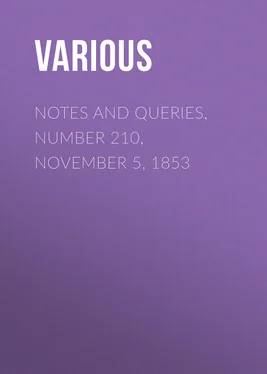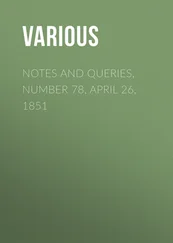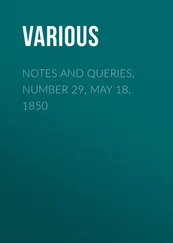Various - Notes and Queries, Number 210, November 5, 1853
Здесь есть возможность читать онлайн «Various - Notes and Queries, Number 210, November 5, 1853» — ознакомительный отрывок электронной книги совершенно бесплатно, а после прочтения отрывка купить полную версию. В некоторых случаях можно слушать аудио, скачать через торрент в формате fb2 и присутствует краткое содержание. Жанр: foreign_antique, periodic, foreign_edu, на английском языке. Описание произведения, (предисловие) а так же отзывы посетителей доступны на портале библиотеки ЛибКат.
- Название:Notes and Queries, Number 210, November 5, 1853
- Автор:
- Жанр:
- Год:неизвестен
- ISBN:нет данных
- Рейтинг книги:4 / 5. Голосов: 1
-
Избранное:Добавить в избранное
- Отзывы:
-
Ваша оценка:
- 80
- 1
- 2
- 3
- 4
- 5
Notes and Queries, Number 210, November 5, 1853: краткое содержание, описание и аннотация
Предлагаем к чтению аннотацию, описание, краткое содержание или предисловие (зависит от того, что написал сам автор книги «Notes and Queries, Number 210, November 5, 1853»). Если вы не нашли необходимую информацию о книге — напишите в комментариях, мы постараемся отыскать её.
Notes and Queries, Number 210, November 5, 1853 — читать онлайн ознакомительный отрывок
Ниже представлен текст книги, разбитый по страницам. Система сохранения места последней прочитанной страницы, позволяет с удобством читать онлайн бесплатно книгу «Notes and Queries, Number 210, November 5, 1853», без необходимости каждый раз заново искать на чём Вы остановились. Поставьте закладку, и сможете в любой момент перейти на страницу, на которой закончили чтение.
Интервал:
Закладка:
The charity-school movement had obtained a strong hold upon the public mind early in the past century; but although I have sought for the name of Blake through many books professing to give an account of the early history of such institutions, I have not yet met with the slightest allusion to him, his school, or his Silver Drops .
The superficial inquirer into the history of English charity-schools will be told that the honour of the first erecting such, and caring for destitute children, is popularly considered due to the parishes of St. Botulph, Aldgate, and St. Margaret's, Westminster: and if he would farther satisfy himself upon that point, he will see it claimed by the first named; a slab in front of their schools, adjoining the Royal Mint, bearing an inscription to the purport that it was the first Protestant charity-school, erected by voluntary contributions in 1693.
If it comes to the earliest London school for poor children, perhaps the Catholics take the lead; for we find that it was part of the tactics of the Jesuits, in the reign of James II., to promote their design of subverting the Protestant religion by infusing their Romish tenets into the minds of the children of the poor by providing schools for them in the Savoy and Westminster.
Blake says, with reference to this movement:
"That the scheme he was engaged upon was a good work, because it will in some measure stop the mouths of Papists, who are prone to say, Where are your works, and how few are your hospitals, and how small is your charity, notwithstanding your great preaching?"
A remarkable little book, and a very fit companion for the Silver Drops of William Blake, to which it bears a striking similarity, is the Pietas Hallensis of Dr. Franck. In this, the German divine relates, in a style which bears more than an accidental resemblance to the work of the Covent Garden Philanthropist, how, little by little, by importunity and perseverance, he nursed his own charitable plans, of a like kind, into full life and vigour; and both Drs. Woodward and Kennett endorse and command the "miraculous footsteps of Divine Providence" in the labours of Dr. Franck. "Could we," says Dr. Kennett, "trace the obscurer footsteps of our own charity-schools, the finger of God would be as evidently in them." Why the Bishop of Peterborough should be ignorant of these earlier efforts to the same end in his own country, is somewhat marvellous. Franck began his charitable work at Glaucha in 1698; while Blake was labouring to establish his Highgate School in 1685. That Franck should know nothing about our pioneer in charitable education, is probable enough; but that the English divines I have mentioned, with Wodrow, Gillies, and a host of others, should be unaware that the proceedings at Halle were only the counterpart of those done fourteen years before by Blake in their own land, is certainly surprising, and affords another proof of the proneness of Britons to extol everything foreign to the neglect of what is native and at their own doors.
Perhaps some of your readers will think I over-estimate the importance of the question, whether the charity-school movement is of British or foreign growth; or whether the honour of its application to the poor (for all charity -schools are not for such) belongs to my subject William Blake, or some other philanthropic individual; if such there be, let them repair to our Metropolitan Cathedral on the day of the annual assemblage of the London charity children: and if, on contemplating the spectacle which will there meet their eye, they do not think it an object of interest to discover who, as Dr. Kennett says, "first cast in the salt at the fountain-head to heal the waters , and broke the ground that was before barren," I pity them.
In concocting this Note, I have had before me the following:
1. Lysons's Environs of London , 1795, where will be found a short notice of Blake. The author, following Gough, makes my subject a madman, and says his scheme "failed after laying out 5000 l. upon it."
2. Sermon preached for Charity-schools , by Dr. Kennett, 1706.
3. Sermons of Dr. Smalridge and T. Yulden , 1710 and 1728. These divines give the precedence to Westminster School, "erected 1688."
4. Wodrow's Letters , edited by Dr. M cCrie, 3 vols., Edin. 1843.
5. Pietas Hallensis : or an Abstract of the Marvellous Footsteps of Divine Providence, in the building of a very large Hospital, or rather a Spacious College, for Charitable and Excellent Uses; and in the maintaining of many Orphans, and other Poor People therein at Glaucha, near Halle in Prussia, related by the Rev. A. H. Franck, 3 parts, 12mo., London, 1707-16. Let the curious reader compare this with Blake's book.
J. O.FOLK LORE
Legends of the County Clare. —About nine miles westward from the town of Ennis, in the midst of some of the wildest scenery in Ireland, lies the small but very beautiful Lake of Inchiquin, famous throughout the neighbouring country for its red trout, and for being in winter the haunt of almost all the various kinds of waterfowl, including the wild swan, that are to be found in Ireland, while the woods that border one of its sides are amply stocked with woodcocks. At one extremity of the lake are the ruins of the Castle of Inchiquin, part of which is built on a rock projecting into the lake, there about one hundred feet deep, and this legend is related of the old castle:—Once upon a time, the chieftain of the Quins, whose stronghold it was, found in one of the caves (many of which are in the limestone hills that surround the lake) a lady of great beauty, fast asleep. While gazing on her in rapt admiration she awoke, and, according to the customs of the Heroic Age, soon consented to become his bride, merely stipulating that no one bearing the name of O'Brien should be allowed to enter the castle gate: this being agreed to, the wedding was celebrated with all due pomp, and in process of time one lovely boy blessed their union. Among the other rejoicings at the birth of an heir to the chief of the clan, a grand hunting-match took place, and the chase having terminated near the castle, the chieftain, as in duty bound, requested the assembled nobles to partake of his hospitality. To this a ready assent was given, and the chiefs were ushered into the great hall with all becoming state; and then for the first time did their host discover that one bearing the forbidden name was among them The banquet was served, and now the absence of the lady of the castle alone delayed the onslaught on the good things spread before them. Surprised and half afraid at her absence, her husband sought her chamber: on entering, he saw her sitting pensively with her child at the window which overlooked the lake; raising her head as he approached, he saw she was weeping, and as he advanced towards her with words of apology for having broken his promise, she sprang through the window with her child into the lake. The wretched man rushed forward with a cry of horror: for one moment he saw her gliding over the waters, now fearfully disturbed, chanting a wild dirge, and then, with a mingled look of grief and reproach, she disappeared for ever! And the castle and the lordship, with many a broad acre besides, passed from the Quins, and are now the property of the O'Briens to this day; and while the rest of the castle is little better than a heap of ruins, the fatal window still remains nearly as perfect as when the lady sprang through it, an irrefragable proof of the truth of the legend in the eyes of the peasantry.
Francis Robert Davies.The Seven Whisperers. —I have been informed by an old and trustworthy servant that about twenty years ago, as he was walking one clear starlight night with two other persons, they heard, for the space of several minutes, high up in the air, beautiful sounds like music, which gradually died away towards the north. He spoke of it as an occurrence not very uncommon, and said it was always called "The Seven Whisperers." On inquiry I found the name well known amongst the poorer classes.
Читать дальшеИнтервал:
Закладка:
Похожие книги на «Notes and Queries, Number 210, November 5, 1853»
Представляем Вашему вниманию похожие книги на «Notes and Queries, Number 210, November 5, 1853» списком для выбора. Мы отобрали схожую по названию и смыслу литературу в надежде предоставить читателям больше вариантов отыскать новые, интересные, ещё непрочитанные произведения.
Обсуждение, отзывы о книге «Notes and Queries, Number 210, November 5, 1853» и просто собственные мнения читателей. Оставьте ваши комментарии, напишите, что Вы думаете о произведении, его смысле или главных героях. Укажите что конкретно понравилось, а что нет, и почему Вы так считаете.












